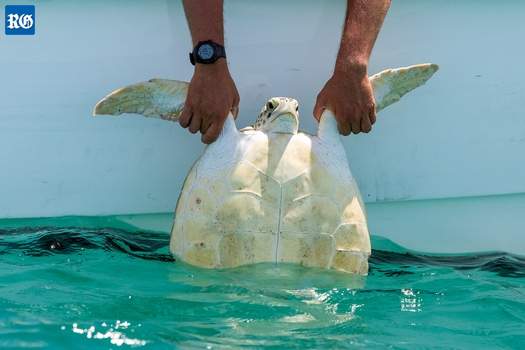Recent News
BZS: Pond Remediation Project A Huge SuccessThursday, January 11, 2018
The Bermuda Zoological Society’s [BZS] Wetlands Remediation Project [WRP], designated the HSBC Global Water Programme for Bermuda in 2014, said they had “great success in its efforts to make two ponds much less toxic for wildlife.”
Video: Bermuda Skink Visits Cahow Burrow
Thursday, January 11, 2018
The camera set up to film Cahows on Nonsuch Island recently caught an unusual visitor, with a critically endangered Bermuda skink stopping by the burrow, wandering around and taking a rather close look at the camera.
Pepper trees removed from Trunk Island
Tuesday, December 19, 2017
Staff from captive insurance firm Artex and their family members helped remove invasive Brazilian pepper trees from Trunk Island.
Artex Team Helps Restoration Of Trunk Island
Thursday, December 14, 2017
Last week, 17 Artex employees and their family members participated in a charitable event in partnership with the Bermuda Zoological Society [BZS] – a registered Bermuda charity that supports the Bermuda Aquarium, Museum and Zoo.
Employees help restore Trunk Island
Thursday, December 14, 2017
Artex employees and their family members helped remove invasive Brazilian pepper trees from Trunk Island.
About
GovernanceAbout Us
Newsletter
Latest News
Gift & Bookstore
Contact
General Inquiries
info@bzs.bm
Latest News
All the latest updates and news from the Bermuda Aquarium, Museum, and Zoo, one of Bermuda's leading visitor attractions!
Owain Johnston-Barnes
Published Jun 27, 2017 at 6:26 pm (Updated Jun 27, 2017 at 6:26 pm)

Nice day for a swim: A turtle caught in the Great Sound in the advance of America’s Cup
is returned to the West End (Photograph provided)
Almost 50 turtles caught in the Great Sound during the America’s Cup have been released after being temporarily held in Harrington Sound.
In May, the Ministry of the Environment announced it would be relocating turtles to prevent the animals from being struck by boats during the course of racing.
According to a spokeswoman, a total of 38 green turtles have been placed back in Western waters, while eight green turtles and three hawksbill turtles were released in the East End in mid-June and are expected to be making their way west.
“When the sea turtles were collected in late May, they were measured, weighed, photographed, microchipped and numbers were painted on their shells,” the spokeswoman said.
“It is estimated that the turtles ate 50 or more heads of lettuce per day while enclosed near the Bermuda Aquarium, Museum and Zoo. They were fed at the deepest point of the enclosure by submerging trays of lettuce arranged to mimic sea grass beds. In this way, human interaction was minimised to prevent habituation,
Ian Walker, the principal curator and veterinarian at BAMZ, said: “While protection of the turtles from heightened marine traffic was the principal aim, we were able to closely monitor this group of green sea turtles. That has added information to our database that some turtles are dealing with very high parasite burdens.
“BAMZ keeps detailed records of all turtles that pass through our hands, whether this group or the turtles brought to us by members of the public for treatment or necropsy. Based on all our data, we think that disease resulting from high parasite burdens is becoming increasingly common.
“As high parasite burdens, often related to malnutrition, is now one of the leading causes of turtle morbidity and mortality in Bermuda, BAMZ is actively pursuing research to better understand and deal with this issue.”
Before release, the turtles were weighed and had flipper tags attached. A very small DNA sample was taken from each individual turtle before groups of turtles were taken by boat to the area where they were first collected in the Great Sound. This is so that these individual turtles can be readily identified if they are returned to BAMZ.
The spokeswoman said the turtles were transported on their backs on beds made from swimming noodles to keep them from moving, and were kept cool and hydrated in transit.
“Now that they are back in the Great Sound, their purpose-built, temporary enclosure will be dismantled,” the spokeswoman added.


